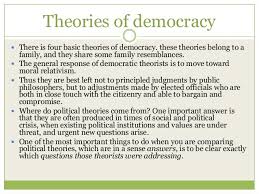Political Science Notes – For W.B.C.S. Examination – Theories Of Democracy.
Individuals may hold the sovereign right of political rule in a democratic country, but it is a public and shared right—no one individual can claim absolute sovereign power and authority. Some individuals may have greater political power, however.Continue Reading Political Science Notes – For W.B.C.S. Examination – Theories Of Democracy.
In a representative democracy, for example, representatives typically wield political power on behalf of citizens and some representatives may have greater or lesser political power relative to other representatives. But if we define sovereignty as the absolute authority and supreme power of political rule, democratic sovereignty is not reserved for particular groups or individuals, nor is it derived from a divine or hereditary right, but rather a general right dispersed at the level of individuals within a political community.
The second element of democracy is that there should ideally be political equality among citizens. Citizenship is a legal status that confers onto an individual the formal recognition that they are a member of a sovereign state. Non-democratic societies still have citizens, of course, but those citizens do not enjoy political rights associated with determining who should exercise political power.
Citizens in non-democratic societies may still have rights, particularly compared to non-citizens in those societies, but political rights are generally very limited or absent. Equality amongst citizens is a democratic ideal, but in reality this equality may be limited, incomplete, or inadequate, even in what is generally considered to be a democratic political community.
In the United States, for example, equal representation in the Senate (2 senators per state) means that the votes of some citizens hold greater weight than others. According to Robert Dahl, a U.S citizen in Alaska has a vote 54 times greater than the vote of a Californian.Likewise, in the selection of the U.S. President through the Electoral College, the absence of a direct popular vote means that votes in some states are more important than votes in other states.
Being a liberal Democratic Party voter in Kansas or a conservative Republican Party voter in California can be a frustrating experience—very often such citizens feel as though their vote doesn’t matter, and this sense of a “wasted vote” can have an overall negative effect on voter turnout.
Please subscribe here to get all future updates on this post/page/category/website


 Toll Free 1800 572 9282
Toll Free 1800 572 9282  mailus@wbcsmadeeasy.in
mailus@wbcsmadeeasy.in



















































































































